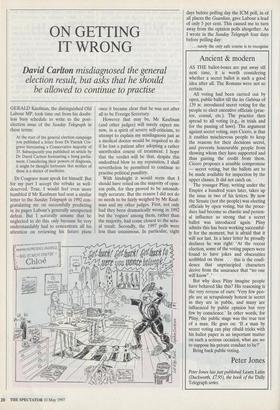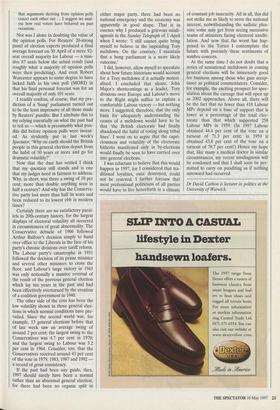ON GETTING IT WRONG
David Canton misdiagnosed the general
election result, but asks that he should be allowed to continue to practise
GERALD Kaufman, the distinguished Old Labour MP, took time out from his doubt- less busy schedule to write to the post- election issue of the Sunday Telegraph in these terms:
At the start of the general election campaign you published a letter from Dr Patrick Cos- grave forecasting a Conservative majority of 35. Subsequently you published an article by Dr David Carlton forecasting a hung parlia- ment. Considering their powers of diagnosis, it might be thought fortunate that neither of these is a doctor of medicine.
Dr Cosgrave must speak for himself. But for my part I accept the rebuke as well- deserved. True, I would feel even more humbled if Mr Kaufman had sent a similar letter to the Sunday Telegraph in 1992 con- gratulating me on successfully predicting in its pages Labour's generally unexpected defeat. But I naturally assume that he neglected to do this only because he very understandably had to concentrate all his attention on reviewing his future plans once it became clear that he was not after all to be Foreign Secretary.
However that may be, Mr Kaufman (and other judges) will surely expect me now, in a spirit of severe self-criticism, to attempt to explain my misdiagnosis just as a medical doctor would be required to do if he lost a patient after adopting a rather unorthodox course of treatment. I hope that the verdict will be that, despite this undoubted blow to my reputation, I shall nevertheless be permitted to continue to practise political punditry.
With hindsight it would seem that I should have relied on the majority of opin- ion polls, for they proved to be astonish- ingly accurate. But the reason I did not do so needs to be fairly weighed by Mr Kauf- man and my other judges. First, not only had they been dramatically wrong in 1992 but the 'rogues' among them, rather than the majority, had come closest to the actu- al result. Secondly, the 1997 polls were less than unanimous. In particular, eight days before polling day the ICM poll, in of all places the Guardian, gave Labour a lead of only 5 per cent. This caused me to turn away from the opinion polls altogether. As I wrote in the Sunday Telegraph four days before polling day:
... surely the only safe course is to recognise
that arguments deriving from opinion polls cancel each other out ... I suggest we anal- yse how real voters have behaved on past occasions.
Nor was I alone in doubting the value of the opinion polls. For Reuters' 20-strong panel of election experts produced a final average forecast on 30 April of a mere 92- seat overall majority for Labour — a mas- sive 87 seats below the actual result (and roughly what a majority of opinion polls were then predicting). And even Robert Worcester appears to some degree to have lacked faith in his own poll (MORI) in that his final personal forecast was for an overall majority of only 101 seats.
I readily confess, of course, that my pre- diction of a 'hung' parliament turned out to be the least impressive of all those made by Reuters' pundits. But I attribute this to my relying essentially on what the past had to tell us — which is presumably what pun- dits did before opinion polls were invent- ed. As stridently put in last week's Spectator, 'Why on earth should the British people in this general election depart from the habit of 50 years or more and go for dramatic volatility?'
Now that the dust has settled I think that my question still stands and is one that my judges need in fairness to address. Why, in short, was there a swing of 10 per cent; more than double anything seen in half a century? And why has the Conserva- tive party lost more than half its seats and been reduced to its lowest ebb in modern times?
Certainly there are no satisfactory paral- lels in 20th-century history, for the largest displays of electoral volatility all occurred in circumstances of great abnormality. The Conservative debacle of 1906 followed Arthur Balfour's decision simply to hand over office to the Liberals in the face of his party's chronic divisions over tariff reform. The Labour party's catastrophe in 1931 followed the decision of its prime minister and several other ministers to cross the floor, and Labour's large victory in 1945 was only notionally a massive reversal of the result of the previous general election which lay ten years in the past and had been effectively overturned by the creation of a coalition government in 1940.
The other side of the coin has been the low volatility shown in those general elec- tions in which normal conditions have pre- vailed. Since the second world war, for example, 13 general elections before that of last week saw an average swing of around 2 per cent; the largest swing to the Conservatives was 4.7 per cent in 1970; and the largest swing to Labour was 3.2 per cent in 1964. Consider, too, that the Conservatives received around 43 per cent of the vote in 1979, 1983, 1987 and 1992 — a record of great consistency.
If the past had been any guide, then, 1997 should surely have been a normal rather than an abnormal general election, for there had been no organic split in either major party, there had been no national emergency and the economy was apparently in good shape. That is in essence why I produced a grievous misdi- agnosis in the Sunday Telegraph of 1 April when I wrote: 'I still cannot quite bring myself to believe in the impending Tory meltdown. On the contrary, I maintain that a hung parliament is a more likely outcome.'
I did, however, allow myself to speculate about how future historians would account for a Tory meltdown if it actually materi- alised. I concluded that sleaze, John Major's shortcomings as a leader, Tory divisions over Europe and Labour's move to the Right might suffice to explain a comfortable Labour victory — but nothing more. I suggested, therefore, that the only basis for adequately understanding the causes of a meltdown would have to be that 'the British electorate had finally abandoned the habit of voting along tribal lines'. I went on to argue that the capri- ciousness and volatility of the electorate hitherto manifested only in by-elections would finally be seen to have carried over into general elections.
I was reluctant to believe that this would happen in 1997, for I considered that tra- ditional loyalties, once destroyed, could not be restored. I further foresaw that most professional politicians of all parties would have to live henceforth in a climate of constant job insecurity. All in all, this did not strike me as likely to serve the national interest, notwithstanding the sadistic plea- sure some may get from seeing successive teams of ministers facing electoral annihi- lation. And now that the worst has hap- pened to the Tories I contemplate the future with precisely these sentiments of sombre concern.
At the same time I do not doubt that a series of sensational meltdowns in coming general elections will be immensely good for business among those who gain accep- tance as political commentators. Consider, for example, the exciting prospect for spec- ulation about the carnage that will open up as 2002 approaches. Above all, there will be the fact that no fewer than 418 Labour MPs depend on a base of support that is lower as a percentage of the total elec- torate than that which supported 258 Labour MPs in 1959. (In 1997 Labour obtained 44.4 per cent of the vote on a turnout of 71.3 per cent; in 1959 it obtained 43.8 per cent of the vote on a turnout of 78.7 per cent!) Hence my hope that, like many a medical doctor in similar circumstances, my recent misdiagnosis will be condoned and that I shall soon be per- mitted to carry on punditing as if nothing untoward had occurred.
Dr David Carlton is lecturer in politics at the University of Warwick.



































































 Previous page
Previous page